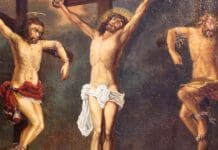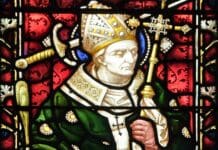 On December 18, we celebrate the feast day of the Expectation of the Blessed Virgin Mary, reminding us that we, too, expectantly wait for the grace and joy of Our Lord and Savior, born on Christmas day. We remember that Jesus was “pre-born” at the moment of the Incarnation, that the Word became flesh when Our Blessed Mother assented to God’s plan, as she spoke to the Archangel Gabriel at the Annunciation. That feast, on March 25, predates today’s feast by nearly nine months.
On December 18, we celebrate the feast day of the Expectation of the Blessed Virgin Mary, reminding us that we, too, expectantly wait for the grace and joy of Our Lord and Savior, born on Christmas day. We remember that Jesus was “pre-born” at the moment of the Incarnation, that the Word became flesh when Our Blessed Mother assented to God’s plan, as she spoke to the Archangel Gabriel at the Annunciation. That feast, on March 25, predates today’s feast by nearly nine months.
We can try to imagine what those nine months were like for The Blessed Virgin, knowing that the Lord grew within her, was one with her. We can only begin to understand the patience she had to possess, looking forward to both the glory and joy of the divine birth. We experience these same feelings—albeit to a lesser extent, no doubt—during this Advent season of preparation. We examine our lives, and look forward to the saving grace of our Lord, as mediated by Our Blessed Mother. While the Lord’s plan was first enacted at the moment Mary was conceived without sin, and made manifest to the Blessed Virgin at the Annunciation, it was made evident to the world at the moment of the Nativity. Prior to that, Mary had seen and heard what others had not, and she had only one more week to anticipate the arrival of her son, Our Lord, the Redeemer of the World!
Our Blessed Mother was the original tabernacle, in which the Word became flesh and dwelt among us. Saint Augustine wrote that Mary conceived the Word in her heart before she conceived the Word in her flesh—that as she anticipated the birth of Jesus, her faith grew simultaneously. The second Vatican Council declared that during the time of her pregnancy, the heart of the Incarnate Word beat gently below her immaculate heart: two immaculate hearts, beating silently and prayerfully as one.
We can imagine Mary’s nine-month journey as one of wonder and anticipation, but given the circumstances she found herself in, we also know of her difficult journey, the doubts of Saint Joseph, the anxiety that she must have experienced during that time. But Our Blessed Mother demonstrated not only patience, but also forbearance and deep trust in the Lord. She knew the road would not be easy—in fact, that her joy would almost certainly be linked to suffering throughout her life—but in hope and confidence placed her life in the Lord’s hands. As she prepared for the birth of Jesus, Mary emptied herself, allowing her body and soul to be filled with the grace and spirit of the Lord. During Advent, we pray for a similar experience, that we might approach the birth of Our Savior with hope and confidence.

















Am wondering what the Church teaches. Was Mary capable of sin?
Mary was incapable of sin since she was conceived without any. She was pure from conception – hence the Immaculate Conception – to her assumption into Heaven. She had to be pure to be the vessel that housed, bore, raised and educated God’s Holy Son.
Technically, Mary was fully capable of sin. She was free from Original Sin, through God’s mysterious mercy, and so had no tendency to sin. We know she never actually committed any personal sin.
Being predestined in a particular way, Mary was saved by God’s grace from the moment she was figured in His plan for our salvation. Thus, she was conceived with the influence or taint of sin; she only benefitted from this gift because she herself was saved by her Son. The handmaid/virgin to conceive the Son would be untainted (hence Isaiah and the Church Fathers used this word in the prophecy) despite Israel being corrupted by sin (ie. abandoning her covenant of fidelity to the Lord). Yet it did not mean that she was neither tempted or that Mary could make choices which might not fully reflect God’s will, as we know from the Gospel account of the Annunciation. But it is her free consent of her own will to fully cooperate with God that makes her most inclined to the work of grace, rather than because she uses her intellect, intuition or conscience. Mary’s way of life therefore is a perfect expression of how depending on one’s faith alone in God – complete trust – we fully allow grace to prevail in our lives, and over sin. This is not to be confused with dependence on God’s providence in a naive way, but rather, cooperating with His Will because of what the Holy Spirit draws us into doing, hence our lives will be an expression of the fruits of the Spirit (Galations 5:22) as Mary’s is.
Because Mary was conceived without the taint of “original sin”, she was free from concupiscence (a tendency to sin). But Mary had free will and thus was capable of sinning. Compare Mary, the “new Eve” with Eve (the original). Both were created in a sinless state, both had free will. The difference is that Eve fell to the sin of pride, saying yes to her will and no to God’s will, and Mary rose to the virtue of humility and obedience and said yes to God’s will.